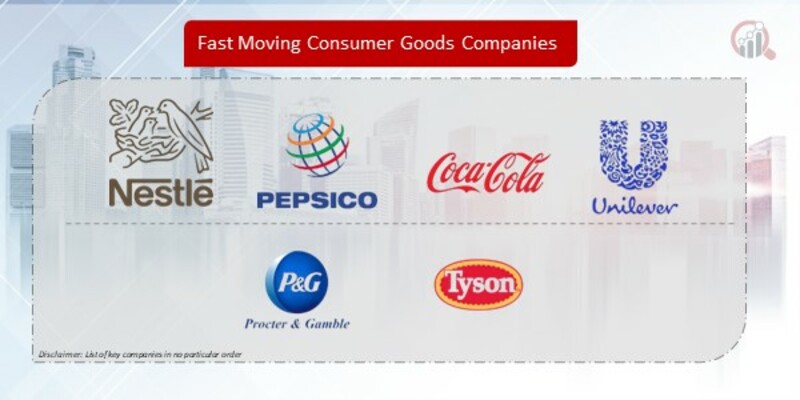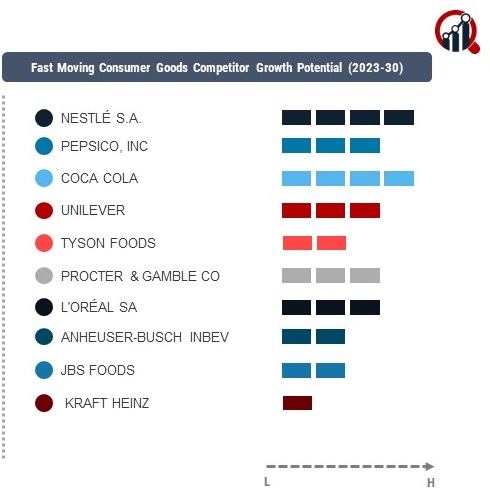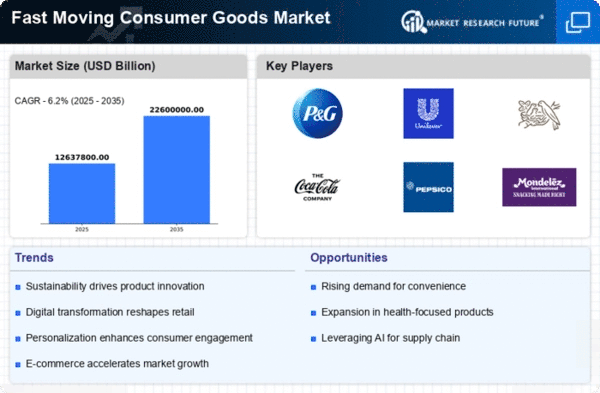Top Industry Leaders in the Fast Moving Consumer Goods Market
 The competitive landscape of the Fast-Moving Consumer Goods (FMCG) market is marked by key players implementing various strategies to navigate the fast-paced consumer demands and dynamic market trends. These players significantly influence industry dynamics, and their strategies collectively shape the overall competitive scenario.
The competitive landscape of the Fast-Moving Consumer Goods (FMCG) market is marked by key players implementing various strategies to navigate the fast-paced consumer demands and dynamic market trends. These players significantly influence industry dynamics, and their strategies collectively shape the overall competitive scenario.
Key Players:
Nestle S.A.
Pepsico Inc.
Coca Cola
Unilever
Tyson Foods
Procter & Gamble Co.
L'OREAL SA
ANHEUSER-BUSCH INBEV
JBS Foods
Kraft Heinz
Strategies Adopted:
The FMCG market adopt various strategies to address the evolving consumer landscape and stay ahead in a highly competitive industry. A common approach involves continuous product innovation, with companies introducing new formulations, packaging designs, and marketing campaigns to keep their brands fresh and relevant. Additionally, strategic mergers and acquisitions, partnerships with retailers, and investments in e-commerce contribute to expanding market reach and ensuring that FMCG products are readily available to consumers.
Efficient supply chain management, optimization of manufacturing processes, and data-driven decision-making are critical elements of the strategies adopted by key players. These strategies enable companies to respond quickly to changing consumer preferences, offer competitive pricing, and maintain a streamlined and efficient distribution network.
Market Share Analysis:
The FMCG industry is influenced by several factors. Brand loyalty, pricing, product availability, and effective marketing campaigns play pivotal roles in consumers' purchasing decisions. Companies that invest in understanding consumer behavior, analyzing market trends, and implementing targeted marketing strategies gain a competitive edge. Furthermore, a strong distribution network and collaborative relationships with retailers contribute significantly to brand visibility and market share.
News & Emerging Companies:
The FMCG market has witnessed the emergence of new and agile players responding to niche consumer demands and market gaps. Emerging companies, such as Beyond Meat and Oatly, have entered the market with a focus on plant-based and sustainable products that resonate with the increasing demand for healthier and environmentally conscious choices. These new entrants often bring innovative solutions to traditional FMCG categories, contributing to the diversification of available products and intensifying overall market competition.
Industry Trends:
The FMCG industry include a growing emphasis on sustainability, digitalization, and direct-to-consumer (DTC) models. Companies are investing in research and development to introduce eco-friendly packaging, reduce carbon footprints, and offer products that align with environmental and social responsibility. Additionally, there is a noticeable trend of companies enhancing their digital presence, optimizing e-commerce platforms, and utilizing data analytics for personalized marketing and supply chain optimization.
Furthermore, the industry has witnessed increased investments in DTC models. Companies are establishing online sales channels, subscription services, and digital marketing strategies to engage directly with consumers. This move not only addresses the evolving needs of tech-savvy and convenience-seeking consumers but also positions these companies strategically in the competitive e-commerce landscape.
Competitive Scenario:
The FMCG market is marked by intense competition among key players, driven by the rapidly changing consumer preferences, technological advancements, and the global focus on health and sustainability. Companies are engaged in a continuous race to offer not only innovative and high-quality products but also solutions that align with broader trends of health consciousness, convenience, and ethical consumption.
The market is also influenced by factors such as the rise of e-commerce, the impact of social media on consumer behavior, and the ongoing global movement toward sustainable and responsible consumption. Manufacturers must adapt swiftly to market demands, ensuring that their FMCG products not only meet regulatory standards but also address the evolving concerns of consumers seeking healthier, more convenient, and sustainable options.
Recent Development
The FMCG market witnessed a notable development with key players focusing on advanced sustainability practices and digital integration. Several major companies announced significant investments in sustainable packaging, circular economy initiatives, and supply chain transparency. This move was in response to the growing demand from environmentally conscious consumers who prioritize sustainable and ethical business practices.
Moreover, there was a discernible trend of companies enhancing their digital capabilities to meet the increasing consumer reliance on online shopping and digital engagement. Major players announced initiatives to optimize e-commerce platforms, utilize artificial intelligence for personalized marketing, and enhance data analytics capabilities. This move not only addressed the challenges of the digital age but also positioned these companies at the forefront of technological innovation in the FMCG market.












